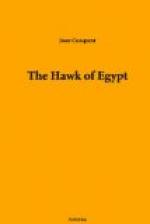That they happened to be in the Oasis of Khargegh, some few hundred miles down the Nile, he was not to know; he only knew that the desert was his home and that in it and of it was his happiness to be found; and it was only when Damaris turned to look at the ruins of the City of On from a far distance that she discovered that they had disappeared in a mist which was merely the combination of the distance and the waters of the oasis evaporating in the morning sun.
She tried to pull the stallion, gently at first, and then with all her might, but to no purpose; for nothing but the voice of his master or his own particular sayis could stop el-Sooltan once he had got the light bit between his teeth; and of the death from thirst which awaited him and his rider upon this particular venture if he continued in his obstinacy he had, of course, no warning.
“What a nuisance,” said Damaris, as she looked round the great yellow plain which stretched, a carpet of level sand, to the west and under her horse’s feet and broke to the east into a chain of hummocks, piled by the last sandstorm which had caused such devastation in the nomad tribes and such annoyance to the visitors at Heliopolis.
She felt no fear, only an increasing vacuum beneath her waistbelt and distress for the worry her long absence might cause her godmother.
“And Well-Well will have chewed everything chewable in the car, also the legs of the sayis, by the time I get back,” she exclaimed. “And I can’t do anything—I’ve irrevocably given el-Sooltan his head. It’s no use slipping from the saddle, because I couldn’t walk back. I can’t . . .”
She broke off suddenly, rose in the stirrups and waved. And a more radiant picture of youth you could not have wished to see in a lifetime.
“A village!” she shouted. “Camels, palms, water. An oasis with tents; women and children and men. Come round, Sooltan, come round.” And she pulled with all her strength, and still to no avail, for, oblivious of the peaceful, verdant patch, the mighty animal forged ahead.
“Well, I shall have to drop from the saddle, let Sooltan go, and walk over to them. They are sure to be friendly and . . .”
She had just slipped her foot from the stirrup when, clear and insistent, there came a ringing cry.
Some way off, the Hawk of Egypt had followed her from the village of Khankah, with intent, knowing the horse she rode, to watch over but not intrude his presence upon her. He had known for some time that el-Sooltan was out of hand, and had decided to call him after a mile or so more of furious exercise; but, instead, quite suddenly and instinctively, he cried, “A’ti balak!—a’ti balak!” which means, “Be careful—be careful,” and pulled the mare to a standstill.
He too had seen the mirage of the peaceful oasis, thrown by the atmosphere from a distance of eighty miles, and with his desert-trained eyes had caught the little movement of the foot; and, connecting the two, he insistently called the stallion, knowing that a drop from the saddle at the almost incredible speed at which Sooltan was going might easily result in twisted ankles or even a broken neck.




